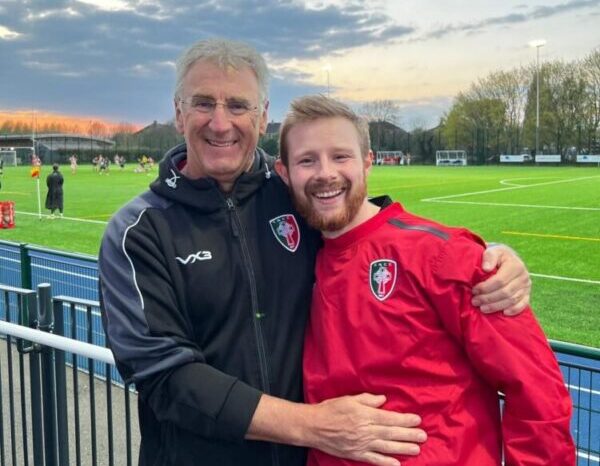27-Year-Old Encourages People To Learn CPR After Dying For 17 Minutes While Playing Rugby

A 27-year-old rugby player has thanked his team for saving his life after suffering a cardiac arrest on the pitch. He was unconscious and received CPR for 17 minutes.
As part of Men’s Health Week, Steff Howells, who is originally from Crymych but now lives in Cardiff, is urging people across Wales to learn or refresh vital CPR and defibrillation skills.
Steff – a young, healthy man – has played for Clwb Rygbi Cymry Caerdydd since moving to Cardiff. He never would have thought that, on one Saturday in October 2022, his life would change.
He said: “It was a regular Saturday. I picked up a coffee with a friend in the morning and went to play rugby on Pontcanna Fields. Next thing I know, I’m waking up a few days later at the University Hospital of Wales with no recollection of what happened.”
“When I found out I had suffered a cardiac arrest on the rugby pitch, I couldn’t believe it. I’m young, I’m fit, I’m healthy, I’ve played over 150 games of rugby. I never thought something like that would even be possible.
“You hear of cardiac arrests happening, but you don’t often hear about them in young people. I was really lucky, my teammates acted quickly, started CPR and ultimately saved my life.”
Early interception is vital when a cardiac arrest happens, and with every passing minute that life-saving CPR and defibrillation isn’t performed, the patient’s risk of survival decreases by 10%.
Dave Pemberton, a consultant orthopaedic surgeon and medic for Clwb Rygbi Cymry Caerdydd, was pitch side at the time and was part of the group who acted quickly when Steff collapsed.
He said: “It was a stressful and difficult situation. I went into professional mode. I could see he wasn’t breathing, and I knew I had to act quickly. My only focus was bringing him back to life. I immediately started chest compressions while another person called 999, and an ambulance was on its way straight away.
“We were lucky to have a defib pitch-side next to us so we could use that on Steff before he was rushed to hospital.
“Those few days following the event were horrible. I went to see him in the hospital afterwards. He was stable, but I was waiting and waiting, and in the back of my mind I was thinking, ‘is he going to wake up? If he wakes up, how is he going to be?’
“It was a difficult time for his friends, family, and for the club’s community. Steff is our openside flanker, one of the fittest guys on the field. It just goes to show that something like this can happen to anyone.”
Approximately 6,000 out-of-hospital cardiac arrests occur in Wales every year. Both Steff and Dave are now urging others across Wales to learn vital CPR skills.
Steff said: “If a cardiac arrest happens to someone close to you, do something. You don’t have to have CPR training behind you to make a difference in a situation like that. It’s an emergency; call 999 and the call taker will tell you what to do.
“I’m not quite back on the rugby pitch, but I’m back training with the boys, going to the gym and playing a bit of 5-a-side football. I’ll forever be grateful for the work of Dave and the team; if they hadn’t acted quickly, the quality of life I would have now would have decreased dramatically.”
Dave said: “If you’re ever in a situation where you need to perform CPR, the first thing you need to do is shout for help. Call 999 and start CPR straight away. Even if you’re unsure, the call taker will talk you through what needs to be done, and they’ll keep talking to you throughout. Help is closer than you think.
“You’ve got nothing to lose. Ultimately, if you do nothing, the person has no chance of surviving.”
Save a Life Cymru is Wales’ national organisation to improve cardiac arrest survival in Wales. It promotes CPR and defibrillation within communities and encourages everyone in Wales to learn or to top up these lifesaving skills. The campaign – help is closer than you think – is backed by rugby legend Shane Williams, who is also an ambassador for Save a Life Cymru.
If a cardiac arrest happens, help is closer than you think. Call 999. The call taker will tell you what to do, talk you through how to do CPR, direct you to the nearest registered defibrillator and they will also send an ambulance crew.
You can find out more about CPR and defibrillation training at https://collaborative.nhs.wales/SaLC.




